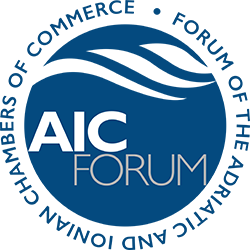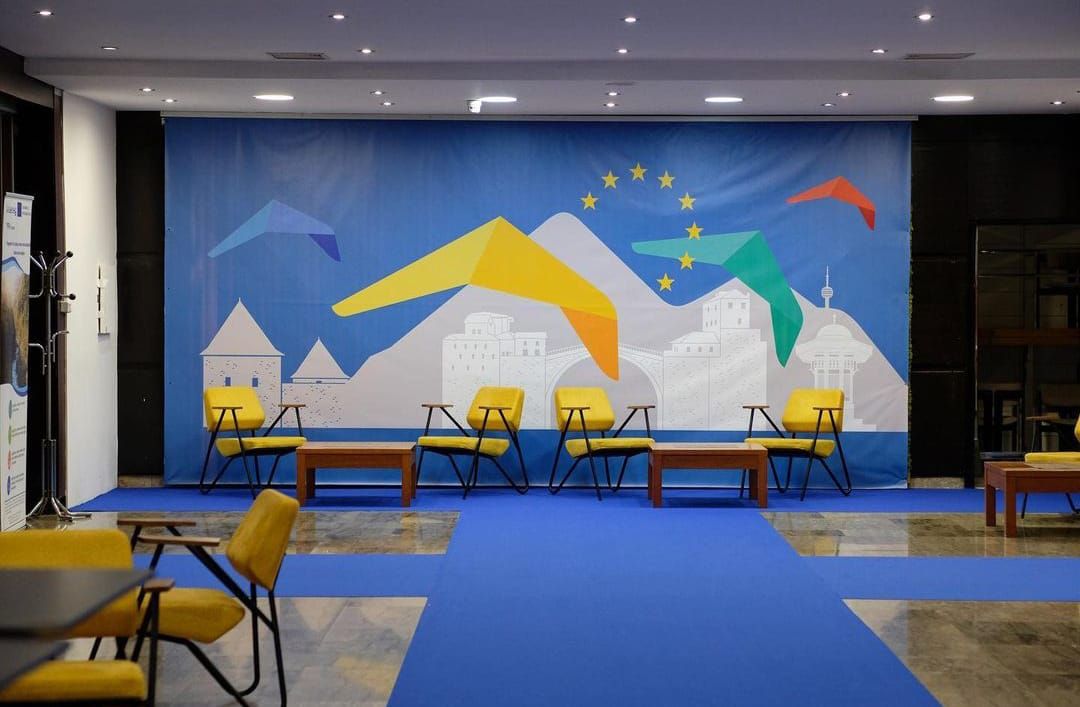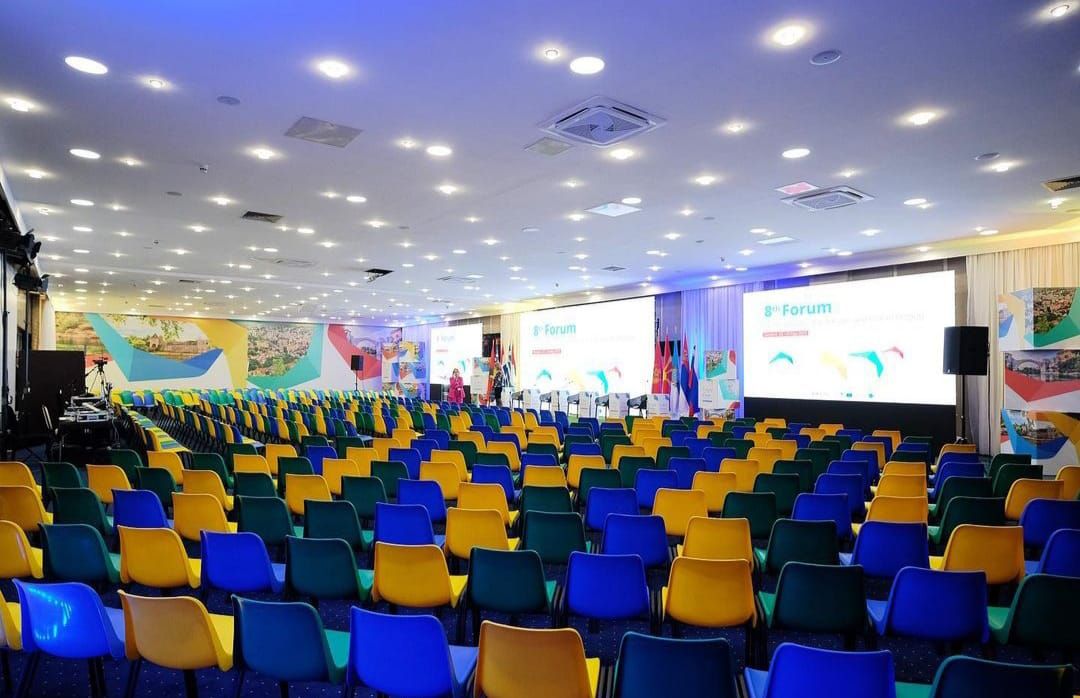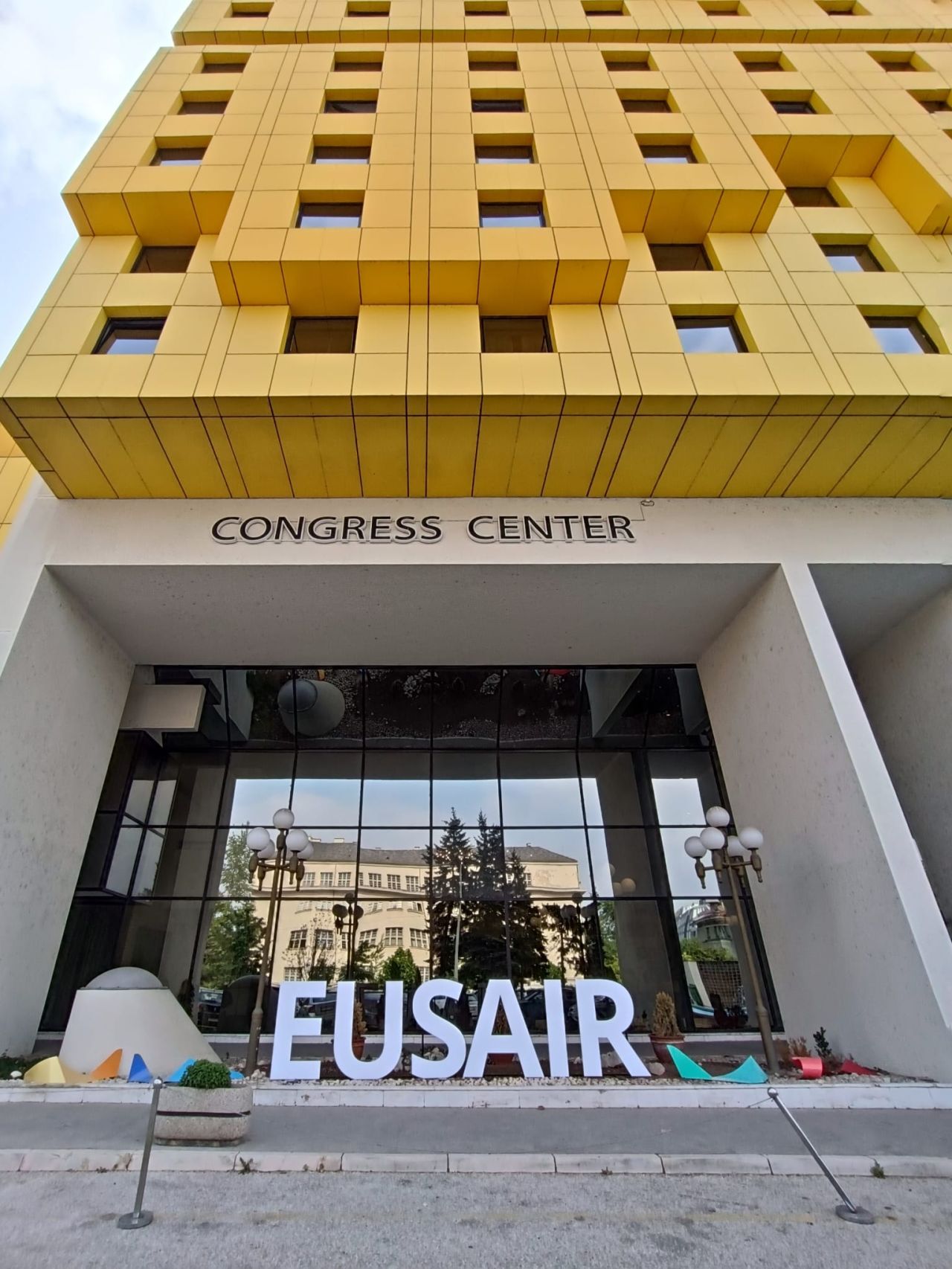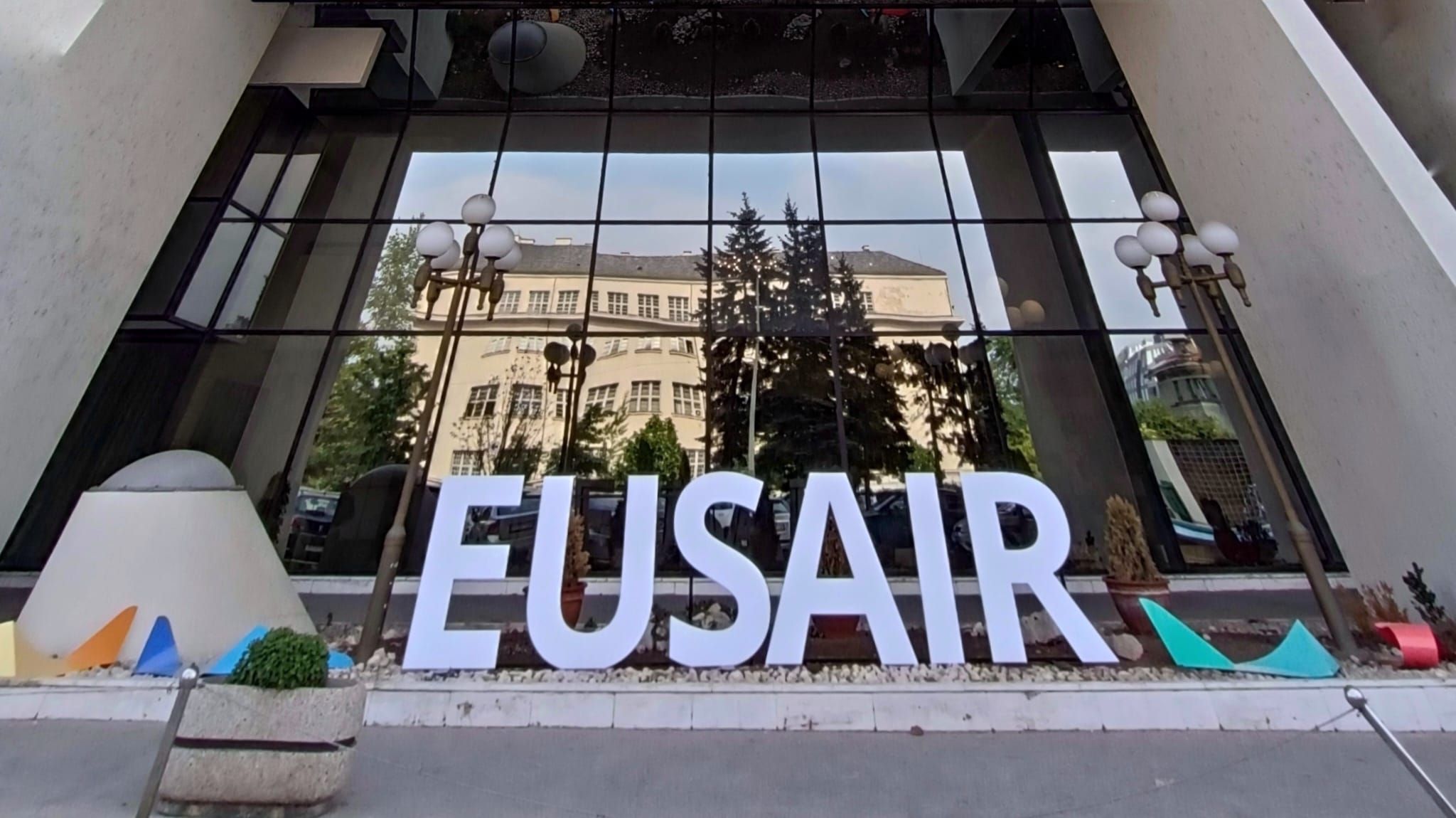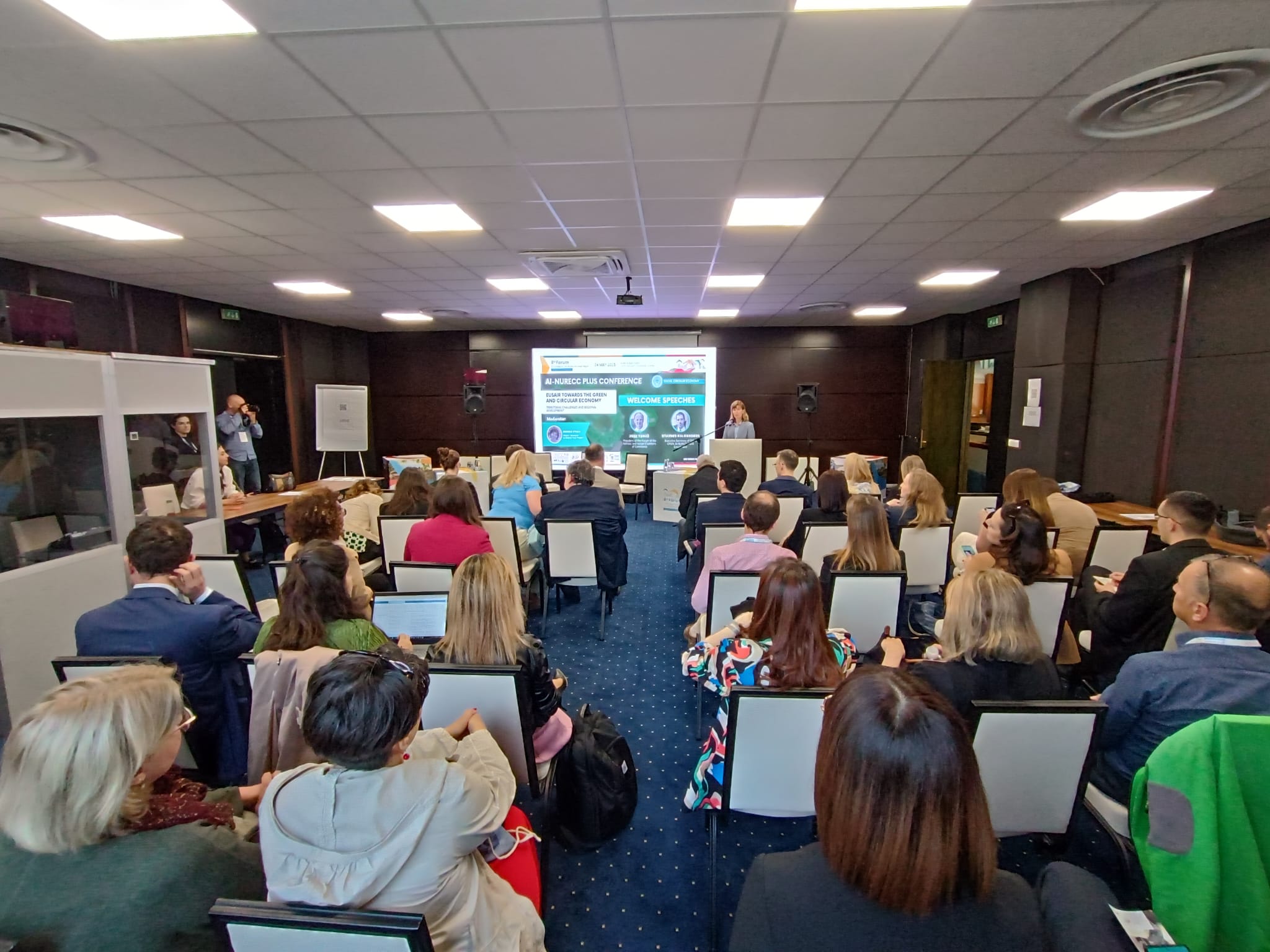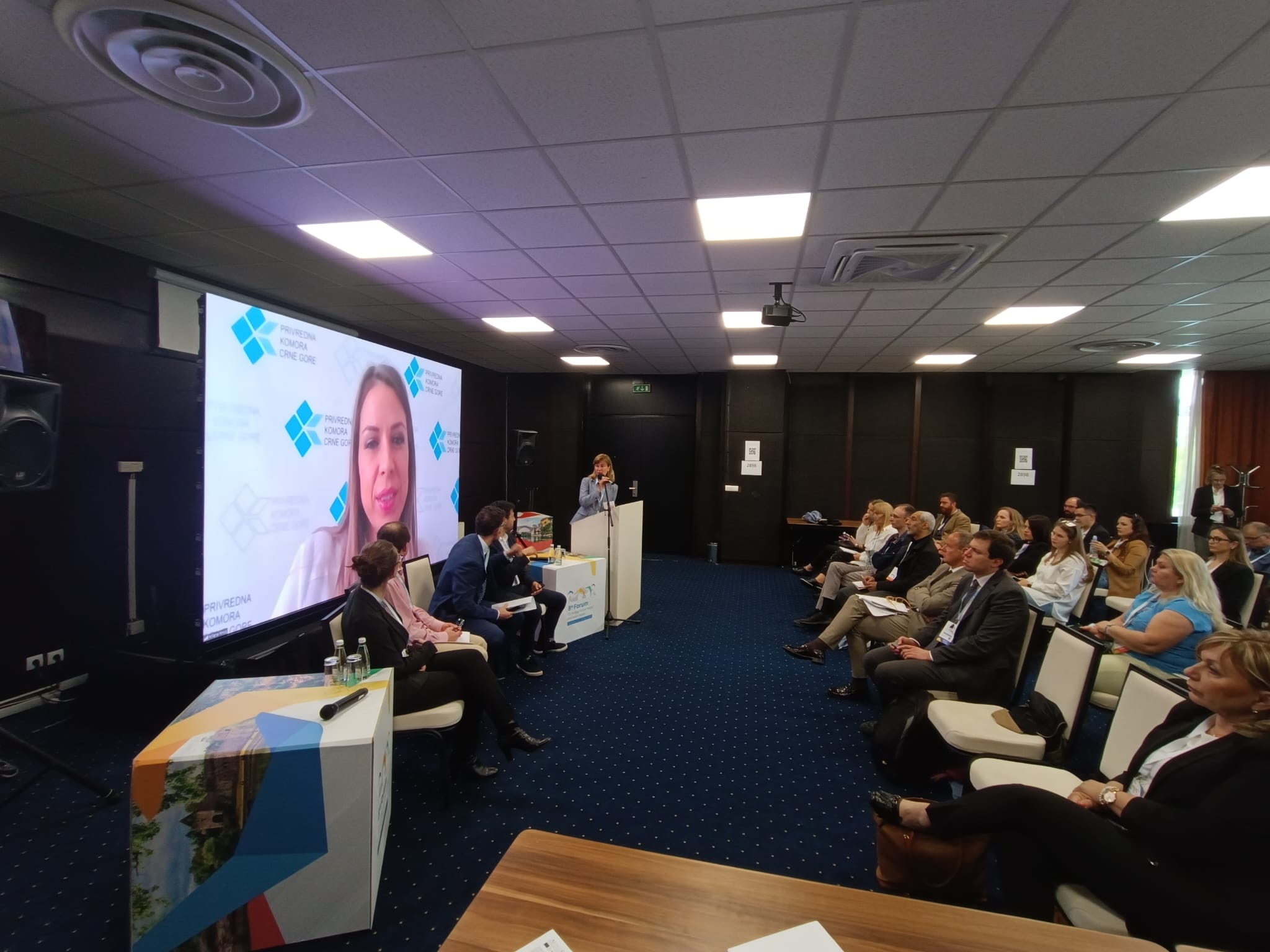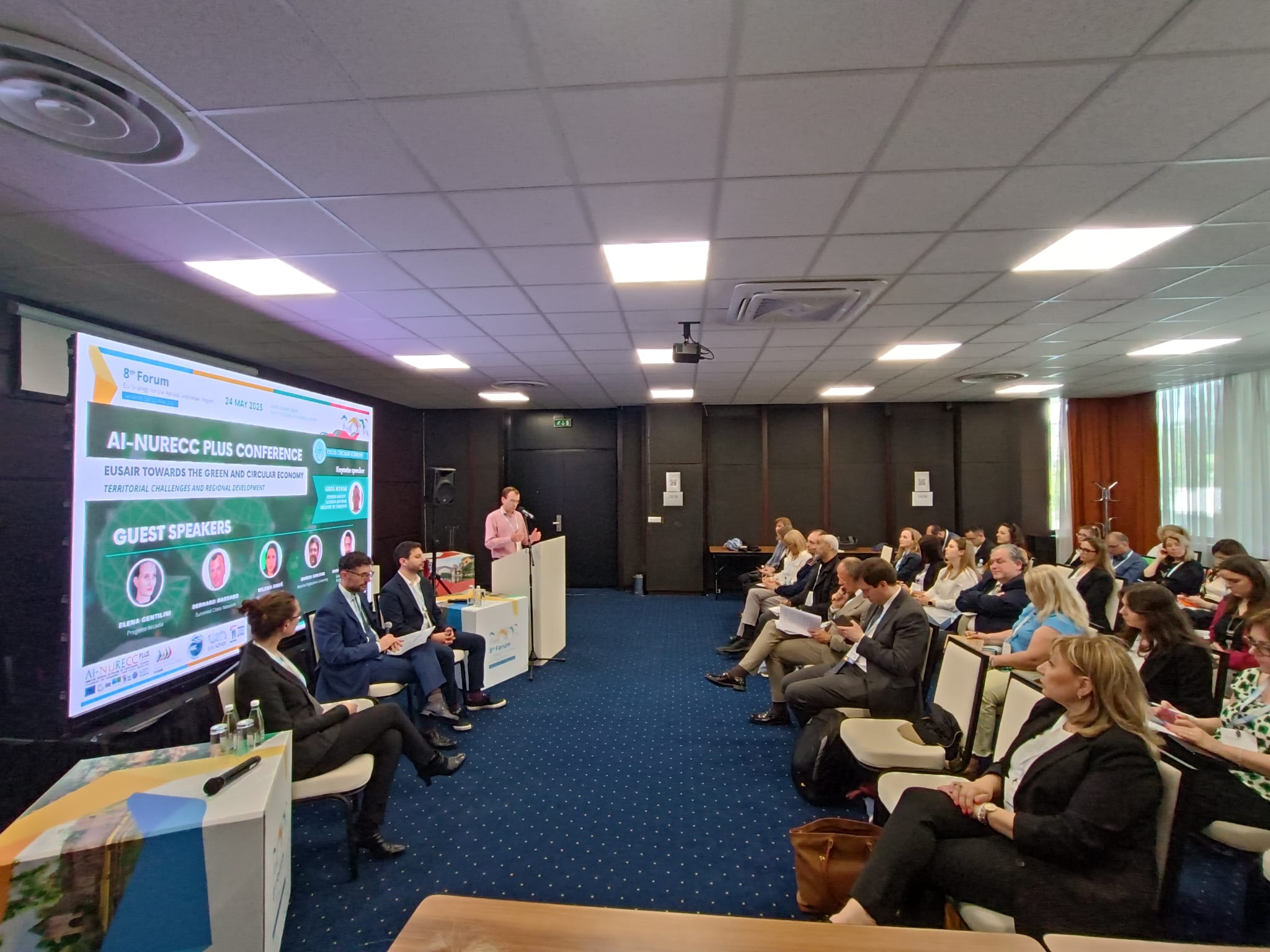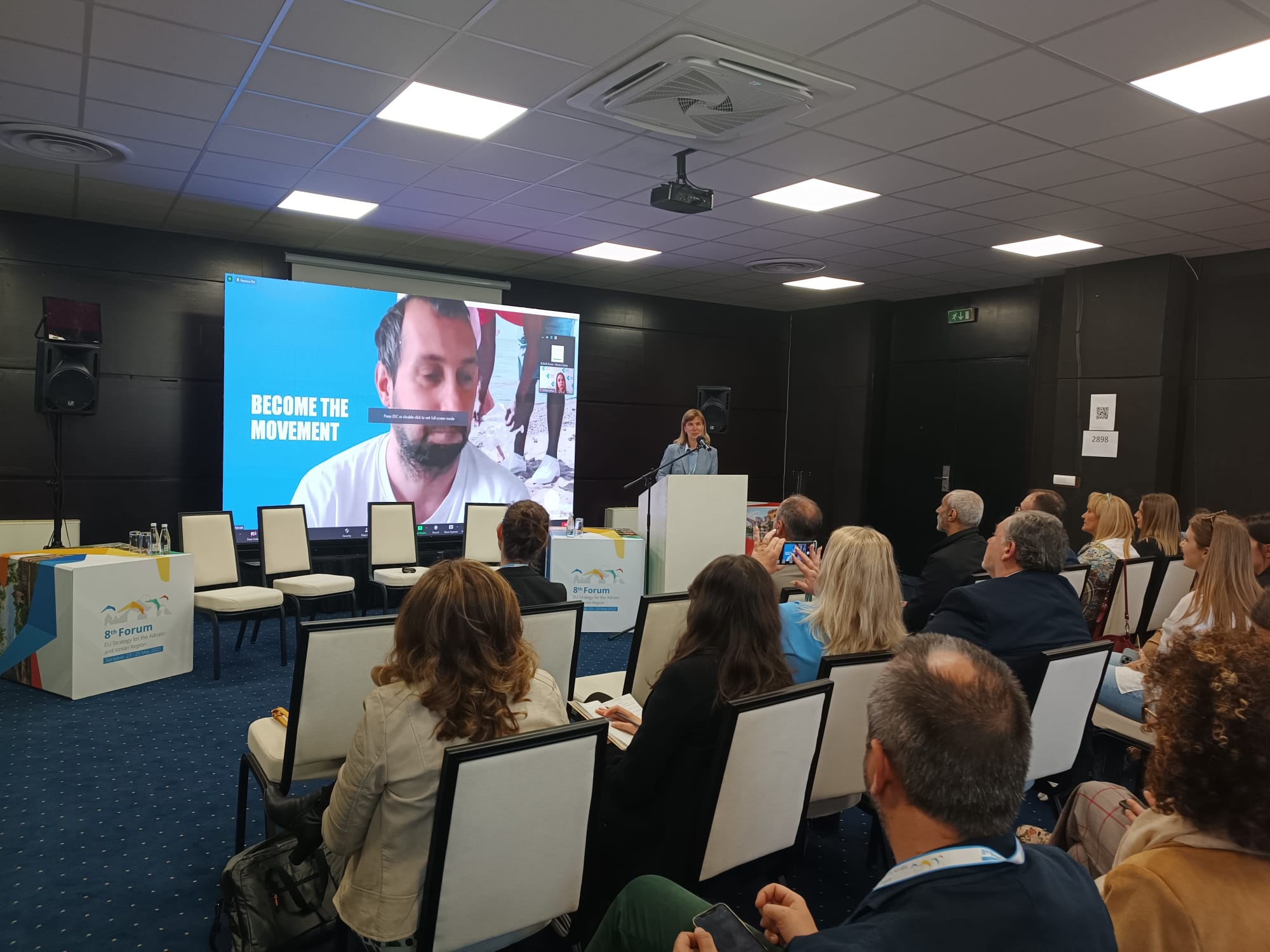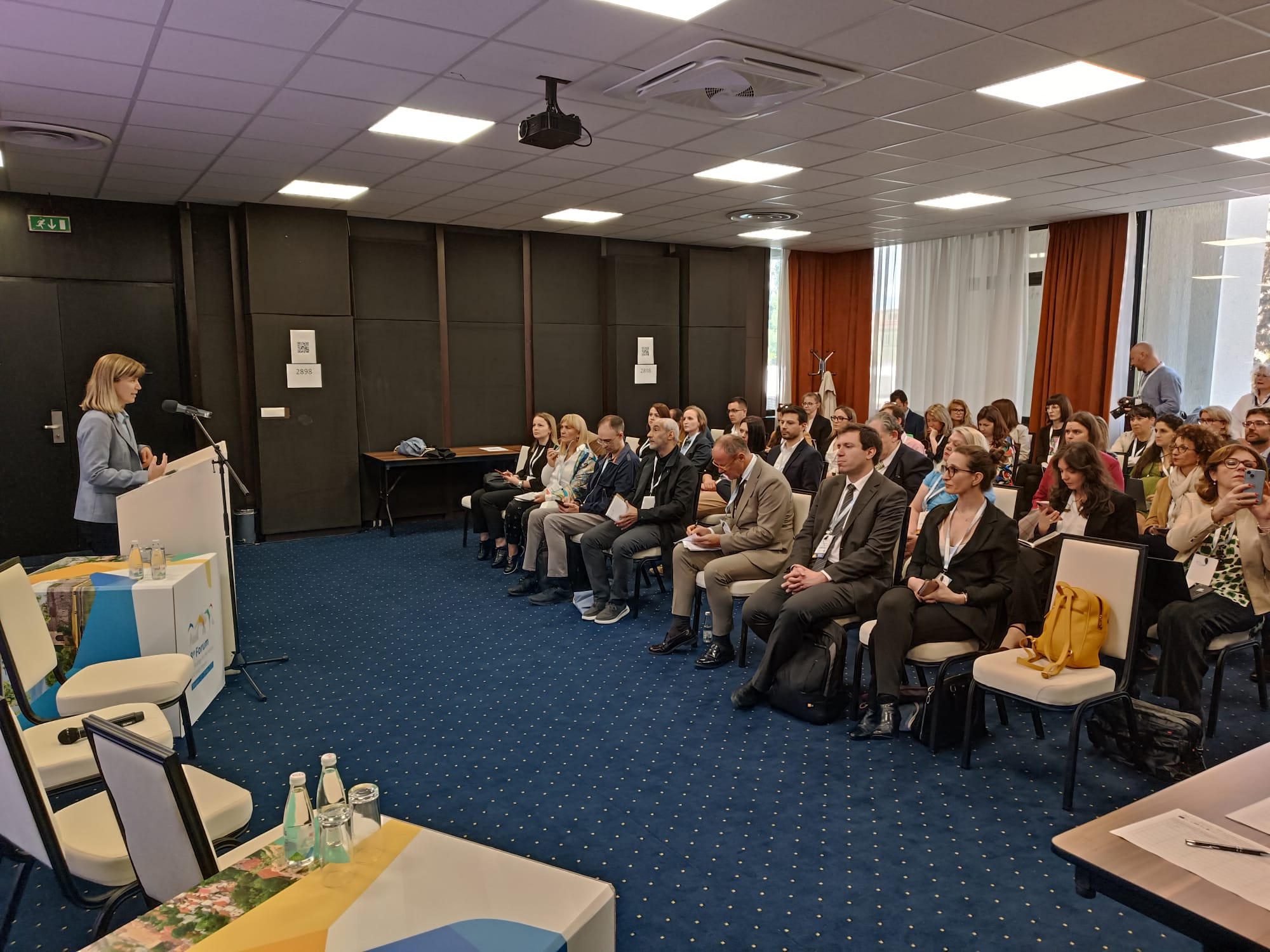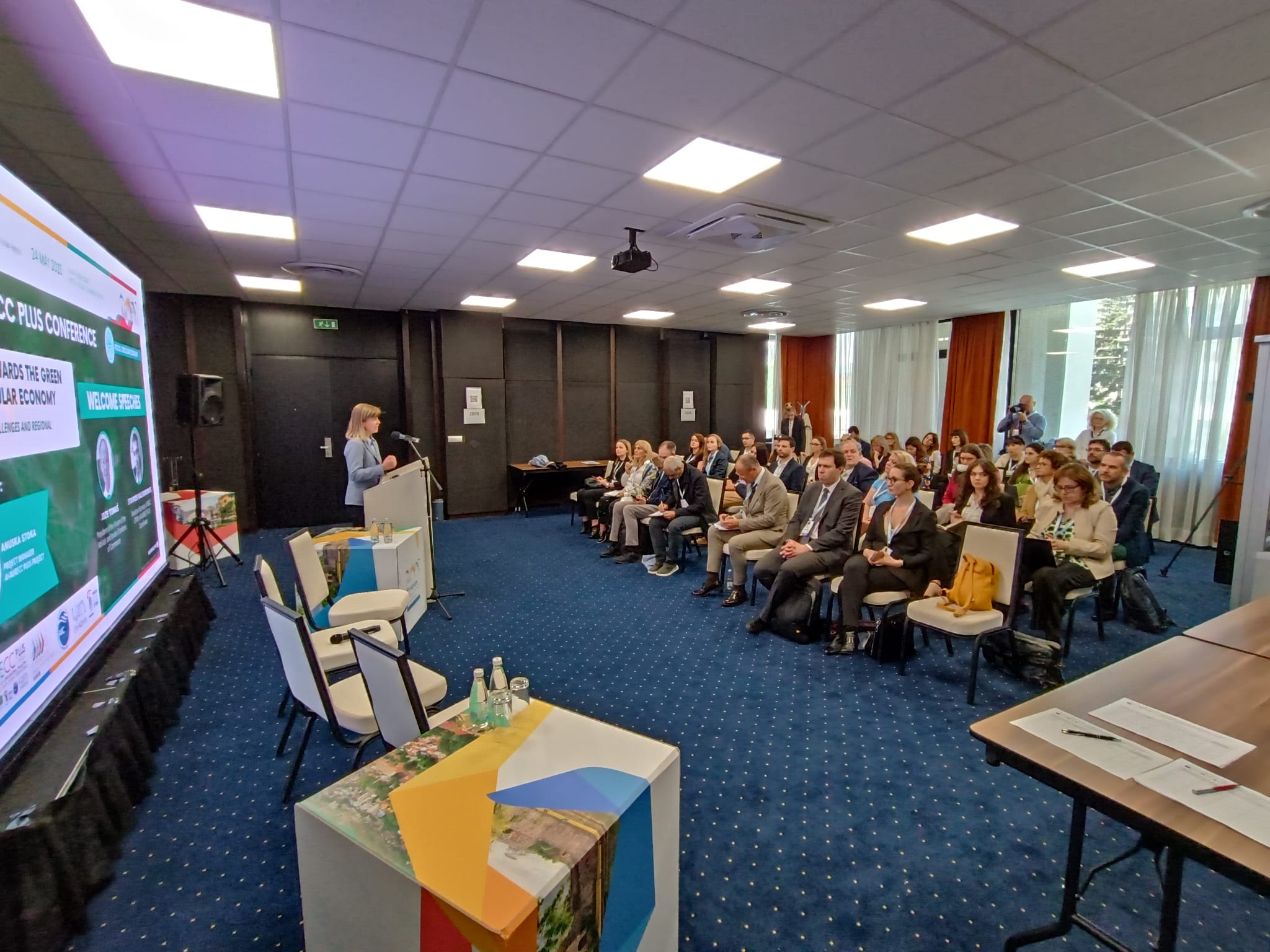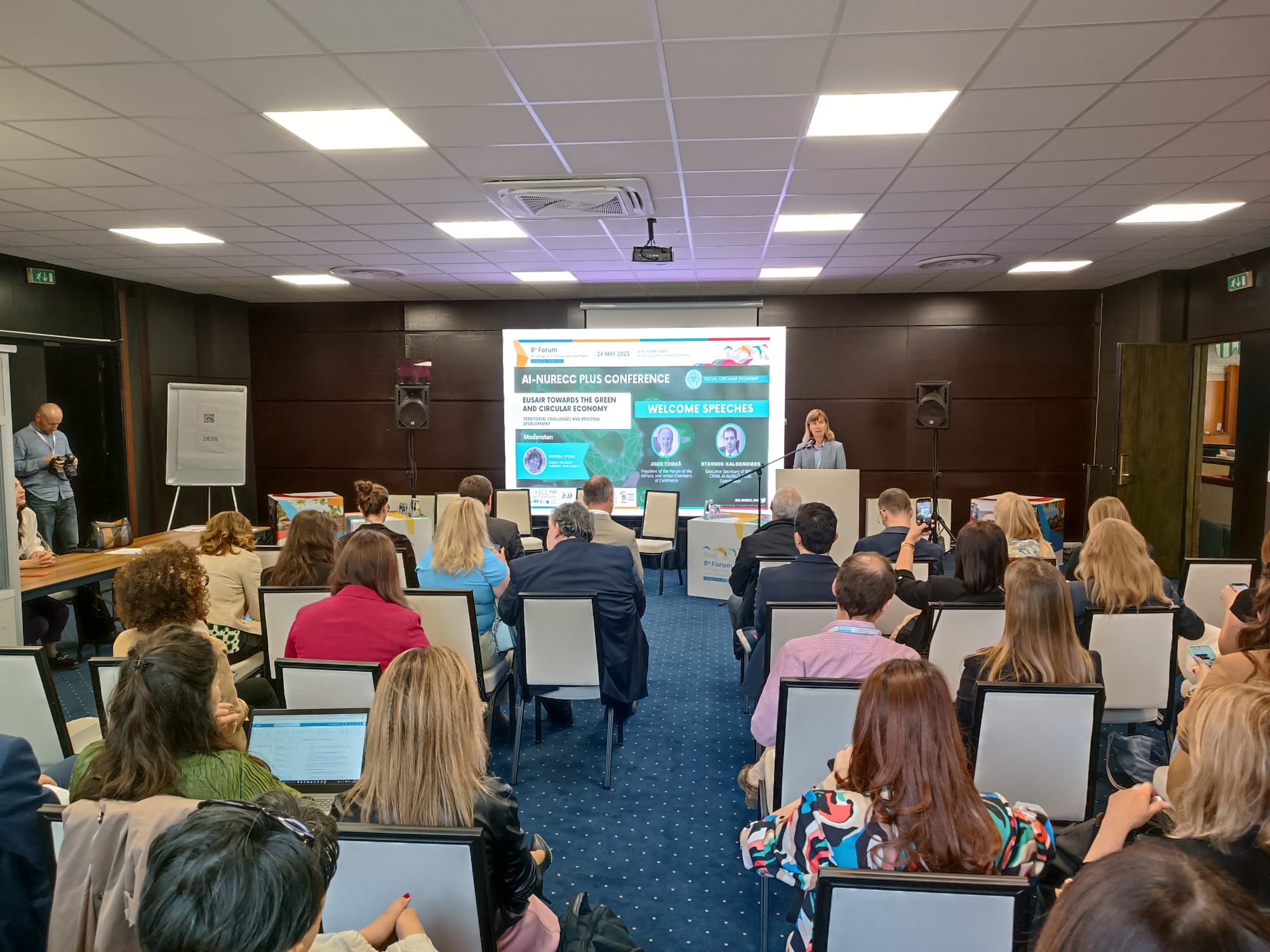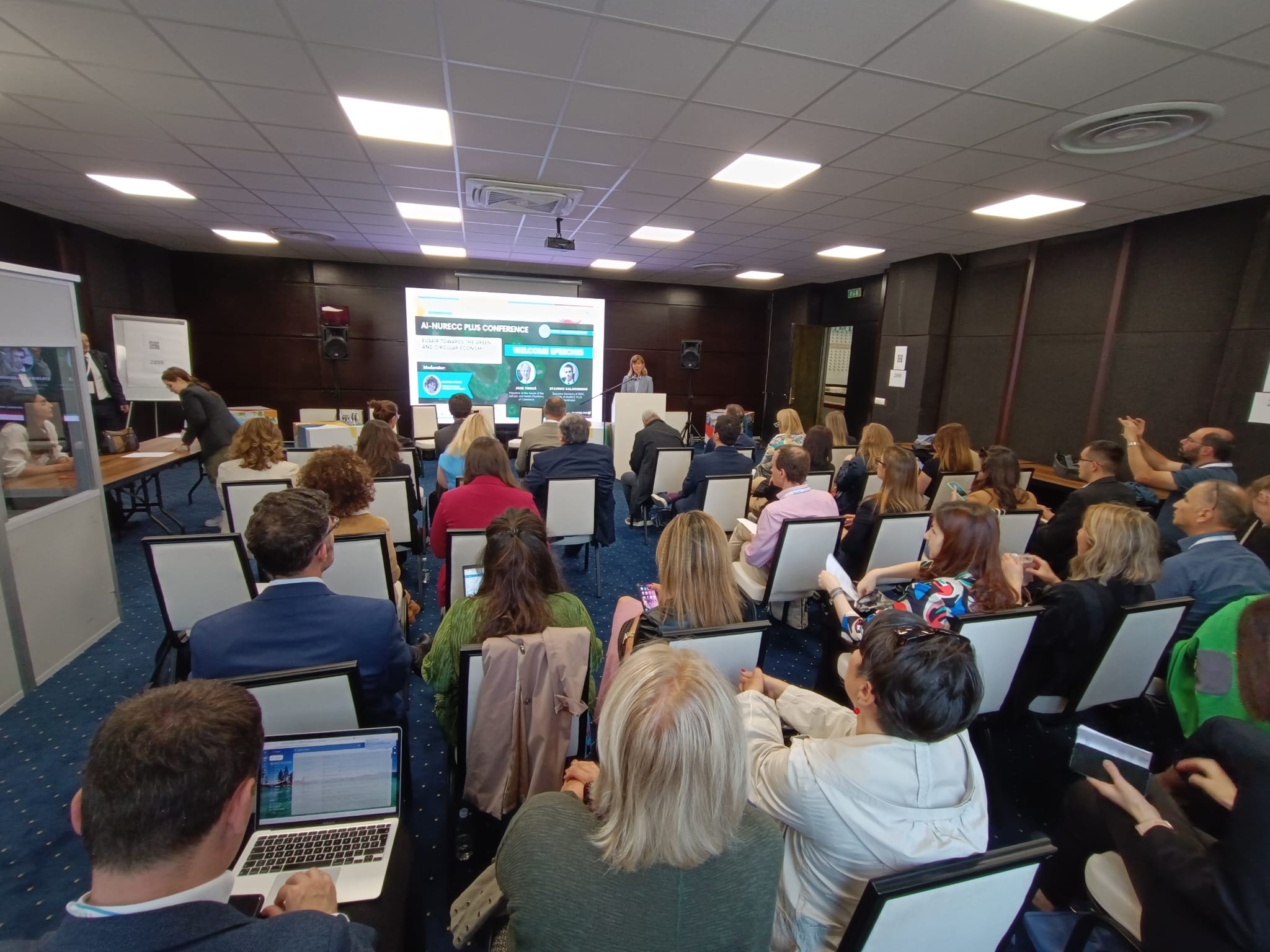In the framework of the 8th EUSAIR Forum under the Bosnia and Herzegovina EUSAIR Presidency, the three Fora within the AI-NURECC Plus Initiative organised the AI-NURECC Plus Conference, on the themes of Green and Circular Economy, that was held on the 24th of May 2023 in Sarajevo and in hybrid modality, seeing the engagement of more than 100 participants, both onsite and online.
The Covid-19 outbreak has radically changed the world’s economy and has posed a new challenge into how sustainable development is to be understood, both socially and economically. In particular, the transition to a more circular economy has gained prominence in the international political debate and has been reaffirmed as a priority of the EU’s sustainable growth agenda as embedded in the “Circular Economy Action Plan” one of the blocks of the new EU Green Deal.
The circular economy is based on the idea that economic growth can be allowed by optimising and regenerating the use of natural resources, minimising environmental pressures and transforming production systems, supply chain and consumption patterns so that they gain long-term sustainability. It is crucial to help European civil society, businesses and consumers to make the transition to a stronger and more circular economy where resources are used in a more sustainable way.
Cross-sector collaboration is an essential factor in order to implement circular strategies or practices (to close loops). Facilitating cross-sector knowledge exchange and cooperation is a core element to take the transition to the Circular Economy, and with this regard the cooperation among the AI-NURECC Plus partners, representing regional and local authorities, universities and business sector, constitute an added value.
The event examined how successful circularity-based and innovative local development policies and policy instruments need to create interconnections between and within sectors, institutions and local actors. There have also been specific focuses on the bioeconomy and circular economy in tourism. Indeed, the bioeconomy aims to drive both sustainable development and circularity through reuse, repair and recycling, reducing the amount and total impact of waste. At the same time circular tourism is the application of circular economy approaches to the tourism sector in order to achieve sustainable tourism.
AI-NURECC Plus addresses the territorial challenges in specific Adriatic-Ionian territories (central, as well as more remote areas e.g. rural area, mountains, islands…); in this respect, the first results of a specific study on territorial challenges and development have been presented with the aim of understanding to what extent the EUSAIR and its future Action Plan contribute to tackle these territorial challenges by promoting sustainable development and growth.
Moderating the debate was Ms. Anuska Stoka, Project Manager, AI-NURECC PLUS (on behalf of the coordinator CPMR), who gave the participants a background for the occasion that brought us together in Sarajevo; the event organised under the umbrella of the AI-NURECC Plus initiative.
AI-NURECC PLUSis the network funded by the European Commission, DG Regio, which unites the main stakeholders of the European Strategy for the Adriatic Ionian Region (so-called EUSAIR) Universities, Regions, Chambers of Commerce and Cities, promoting a bottom-up participatory approach between civil society and governance. It focuses in particular on the following sectors: Sustainable Tourism, Cultural and Creative Industries, Blue Economy and Circular Economy and, as a transversal priority, youth.
Sarajevo’s event, in particular, intended to examine the need to create interconnections between and within sectors, institutions and local actors through circularity-based and innovative development policies and instruments.
The meeting opened with greetings from the President of Split Chamber of Economy and of the Forum of the Adriatic and Ionian Chambers of Commerce, JozeTomaš, who welcomed all the participants both online and onsite and introduced the speakers. He then stressed the importance of the occasion: “Within the 8th EUSAIR Forum in the framework of the Bosnia and Herzegovina EUSAIR Chairmanship, in Sarajevo, we see the natural following of a years long fruitful relationship between Civil Society and the governance and therefore It is critical to nurture the synergy that has grown between these actuators, two sides of the same coin. The synergies between the AI-NURECC stakeholders are essential to ensure the development of a more sustainable reality; from university training to the support of local and regional actors and also to the support of chambers of commerce and the economic -financial world”. In closing, the President thanked all the AI-NURECC Plus project partners for their commitment and wished all the participants a good and fruitful day of interventions that could hopefully allow us all to give a better response to the necessities of the Adriatic and Ionian Area.
Mr. Stavros Kalognomos, Executive Secretary of the Balkan and Black Sea Commission (BBSC), Conference of Peripheral Maritime Regions (CPMR) – AI-NURECC PLUS Coordinator, then offered participants a general overview on the AI-NURECC Plus Initiative, introducing the project partners and the main goals in the fields of sustainable tourism, cultural and creative industries and circular economy. He also mentioned the occasion, during this 2023, of the European Year of Skills, underlying the importance of networking and cooperation, which are at the heart of the Initiative and which put together public and private sector and civil society, to foster development in the area by encouraging the exchange of best practices.
The Event then got to the heart of the discussion with the Keynote address, Mr Uroš Novak, Expert in Biotechnology, KemijskiInštitut – Slovenia National Institute of Chemistry.
He introduced to the audience the newly launched REMEDIES – MEDITERRANEAN SEA BASIN LIGHTHOUSE project, which focuses on the restoration of oceans and waters, provision of clean water, as well as measures that contribute to climate protection. The REMEDIES project’s consortium is coordinated by the National Institute of Chemistry in Slovenia and builds its innovation actions around the three main pillars: monitoring plastic waste, plastic collection and valorisation, and preventing the proliferation of non-degradable plastics. The project specifically focuses on technology development, aiming to create a sustainable change towards plastic prevention by using traditional and modern communication channels and promoting participatory processes to develop a more plastic-conscious society.
To achieve the ambitious goals of the project consortium, the following specific objectives are to be achieved over the next four years:
- Monitoring of macro- and microplastic waste in eight Mediterranean areas.
- Collection and recycling of >422 tonnes of plastic waste.
- Preventing the dumping of the equivalent of >61 tonnes of plastic.
The panel session started with Ms. Elena Gentilini, Expert in Circular Economy, Progetto Arcadia, who is involved in the European Project CEnTOUR – Circular Economy in Tourism, under the COSME programme. She confirmed that the Circular Economy, while being very challenging, is also one of the areas in which innovation is mostly taking place nowadays. The project, started in 2020, supported 65 SMEs from Greece, Italy, Moldova, North Macedonia and Spain, to rethink and implement more green and sustainable business practices through Capacity Building activities focused on 3 main topics:
- Food Waste
- Plastic Use Reduction
- Collaborative Consumption
- Additional topic: Renewable Energy
The European Union is focusing more and more on the concept of “Ecosystem”, different from that of “System”, being it formed by the interaction of coacting organisms, therefore capable of crushing boundaries. It also strongly relies on Civil Society to be able to engage different actors on different levels of action.
The second panellist was Mr. Bernard Massabo, Secretary General of the Euromed Cities Network. Mr Massabo introduced some of the key benefits and challenges brought by a circular, green approach through the “Dialogue4LivingAreas project” (Interreg EURO-MED).
He stressed the importance of green and blue infrastructures, that are not only useful for biodiversity purposes, but they also represent great tools in the fight against climate change; so it is essential to encourage stakeholders to work together on those thematics.
The 7 years project intends to improve policies and institutional dialogue, to deliver improvement of skills from the point of view of knowledge transfer and capacity building, in order to capitalise on what has already been done and achieve even more concrete results.
The third speaker was Ms. Milena Rmuš, Coordinator for Environment Protection and Energy Efficiency, Chamber of Economy of Montenegro. The Chamber has implemented a Roadmap towards Circular Economy in Montenegro, the 1st legal strategic document mapping the path of Montenegro towards circularity, launched in April 2022. Circular Economy is an opportunity for the business sector, therefore the Chamber was called to implement, together with the Government, a national strategy for circular transition in the country. Circular skills are needed for the future of every business; taking into consideration the global challenges the world is facing, digitisation and Innovation become crucial factors for the sustainability of the businesses. The Roadmap focuses on 5 main areas (Food System, Forest System, Built Environment, Manufacturing, Tourism), explaining in which direction to go in order to implement circular practices. Horizontal areas were also identified (Waste and Water management, GPP, Awareness/Education, Systemic Collaboration, Legal Framework, Special Planning, Transports System, Renewable Energies), in a multilayered and cross sectoral approach. In conclusion, what is still to be done is to motivate and educate the businesses, raising awareness and facilitating networking activities between private and public sector, the institutions and the Civil Society. The Chamber of Montenegro has therefore set up a “Circular Economy Hub”, an open platform to encourage dialogue.
The fourth speaker was Mr. Marco Giuliani, Professor at Marche Polytechnic University, who presented the “AMOCEAB – Adrion Master On Circular Economy And Bioeconomy” (Interreg ADRION). The project started in January 2023 aims at creating a transnational network of companies, universities and public bodies to discuss Circular Economy and Bioeconomy practices; moreover, il will develop a Master aiming at creating competencies and skills to develop solutions and know-how on green economy from Management, Engineering, science and Sociology curricula, in an interdisciplinary approach. The Master will be addressed to youth, in need of creating new competences, but also to whomever might be interested in reskilling and upskilling. One of the protagonists of this project is UniAdrion, Network of Adriatic and Ionian Universities, which will act as a lever to spread the results. A Position Paper will also be produced, combining literature and some best practices in the region; the reason for that is the need to match the needs of the companies with the expectations and set of skills of the younger generations.
The fifth and last speaker was Mr. Marco A. Segovia Bifarini, External expert AI-NURECC PLUS Circular Economy, who presented the Preliminary results of the “Circular Economy – EUSAIR territorial challenges and development” Study, implemented within the framework of AI-NURECC PLUS Initiative. Mr. Bifarini underlined the importance of younger generations in taking the lead in the transformation towards a more circular economy, relying on their fresh vision and strong dedication to the thematic. The study, which started in March 2023 and is foreseen to be concluded in July 2023, saw a combined approach of desk research, literary review and stakeholders engagement, via surveys and interviews that have been disseminated by the Fora of Civil Society and are still ongoing. It is important to remember that the Circular Economy connects to all the pillars of the Strategy for the Adriatic and Ionian Region (Blue Growth, Environmental Quality, Connecting the Region, Sustainable Tourism), thus having a transversal nature. Different drivers of Circular Transformation have been identified in the Region, the most important being “Resilience”, and different trends, among those: Circular Economy Hubs, Circular Policies, Funds from different EU programmes devoted to Circularity Development, Academic Innovation, Networks of Businesses. The Study then touches on the topic of policy frameworks, from a European level to the Western Balkans, to National policies, in order to set the context and give an overview of the state of art in terms of Circular Economy to find further opportunities for development.
The biggest opportunity, as mentioned by all the speakers in the session, is “Connection”. There is already a lot going on in the region, sometimes not well communicated, sometimes overlapping. As stakeholders of the EUSAIR, we have the opportunity to build bridges between the different actions that are being taken and thus obtain stronger and more concrete results.
Q & A Session
To this last intervention, Mr Marco Giuliani commented on the risk of considering the pillars as independent entities and categories that don’t necessarily communicate among each other; underlying how the idea of “Clusters” can be considered too specific, while the concept of “Value Chains” is considered to be more trans-sectoral. He then asked Mr. Bifarini if, in the process of the AI-NURECC PLUS Study, the idea of “Nudging” had been taken into consideration; that is to say, giving to organisations specific directions on how to embark on the path towards sustainability in a more gentle but consistent way. He then confirmed the strong interest in focusing on SMEs, considering that it is usually more common to see Big Enterprises undertake the Circular Economy journey.
Mr. Bifarini confirmed that the “Value Chain point of view” is the one taken into consideration for the Study, focusing on Systems. He underlined the fact that large businesses, through their Corporate Social Responsibility have access to global value chains addressing Circular Economy criteria, and this surely reflects on SMEs. To the concept of Nudging, he added that bottom-up solutions need to be implemented in order to meet “in the middle” with the top-down policies and directives coming from the governance.
To conclude, during this event, the most important message from the speakers is the urgency and necessity to network and act with a collaborative perspective, beliefs that are at the heart of the AI-NURECC PLUS Initiative and the EUSAIR Strategy and that put together public and private sector and civil society, within the concept of “Ecosystem”, in order to foster and ensure the development of a more sustainable reality.
Let the debate continue!
Watch the RECORDING of the Event and interact with us on our social pages!
________________________________
_______________________
________________
